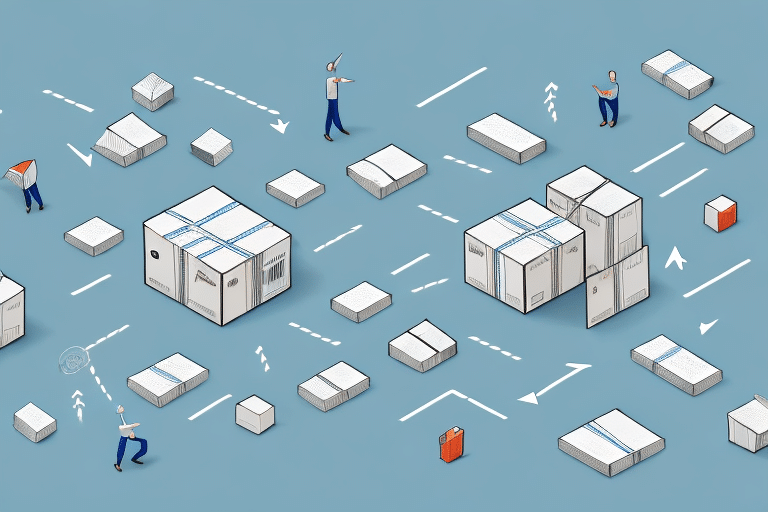What Is 3PL in Supply Chain Management?
In the realm of supply chain management, businesses rely on third-party logistics providers (3PL) to streamline and optimize their logistics operations. Simply put, 3PL companies offer comprehensive logistics services to businesses that outsource these functions to gain efficiency and focus on their core competencies. 3PL providers handle critical logistics tasks—from inventory management and warehousing to transportation and freight management. This article delves into the evolution of 3PL, the benefits and drawbacks of outsourcing logistics to a 3PL provider, the various types of 3PL services, and key factors to consider when selecting the right 3PL provider for your business.
The Evolution of 3PL and Its Importance in Modern Supply Chain Management
The concept of 3PL originated in the 1970s with the growth of global trade and the need for businesses to streamline their logistics operations to meet increasing demand. Initially, companies engaged 3PL providers to manage their transportation needs. Over time, 3PL providers have evolved into full-service logistics partners capable of handling inventory management, warehousing, transportation, and a broad range of logistics-related tasks. The importance of 3PL in modern supply chain management is significant, as businesses face intensifying competition and globalization pressures. By outsourcing logistics to a 3PL provider, companies can benefit from economies of scale, enhanced efficiency, and expanded operational capabilities, enabling them to remain agile and competitive in today’s fast-paced market.
One of the key benefits of partnering with a 3PL provider is access to advanced technology and expertise. Leading 3PL providers invest heavily in state-of-the-art logistics technologies, such as Warehouse Management Systems (WMS) and Transportation Management Systems (TMS), which help businesses improve supply chain visibility, reduce costs, and enhance customer service. Additionally, 3PL providers possess deep industry knowledge and expertise in logistics and supply chain management, allowing businesses to identify and rectify inefficiencies within their operations.
Furthermore, 3PL providers enable businesses to scale their operations quickly and efficiently. As companies expand into new markets or experience seasonal fluctuations in demand, they can leverage the resources and infrastructure of a 3PL provider without the need for substantial capital investments in logistics infrastructure or workforce expansion.
Benefits and Challenges of Outsourcing to 3PL Providers
Outsourcing logistics operations to a 3PL provider offers several notable benefits. Among these, cost savings, improved efficiency, and enhanced customer satisfaction stand out. 3PL providers possess the expertise, technology, and established networks necessary to optimize logistics operations, thereby reducing transportation and warehousing costs and improving delivery times. These improvements can lead to higher customer satisfaction as businesses can offer faster and more reliable delivery services.
Benefits:
- Cost Savings: 3PL providers leverage economies of scale to negotiate better rates with carriers and optimize supply chain operations, leading to significant cost reductions for businesses.
- Efficiency: With specialized expertise and advanced technology, 3PL providers streamline logistics processes, minimize errors, and expedite order fulfillment.
- Flexibility and Scalability: 3PL providers offer flexible solutions that can scale according to business growth or seasonal demand fluctuations, allowing businesses to adapt swiftly without major investments.
- Access to Technology: Businesses can benefit from the latest logistics technologies without the need for extensive capital investments.
Challenges:
- Loss of Control: Outsourcing logistics functions means businesses have less direct control over their supply chain operations, which can lead to concerns regarding quality and responsiveness.
- Communication Issues: Effective communication between the business and the 3PL provider is crucial. Miscommunication can result in operational inefficiencies and customer service issues.
- Data Security Risks: Sharing sensitive business and customer data with a 3PL provider introduces potential data security risks. It is essential to ensure that the provider has robust data protection measures in place.
- Dependency: Relying heavily on a 3PL provider can create dependency, making it challenging to switch providers or bring operations back in-house if needed.
While outsourcing to a 3PL provider presents certain challenges, many businesses find that the benefits far outweigh the drawbacks. Thoroughly vetting potential 3PL partners and establishing clear communication channels can help mitigate these challenges and ensure a successful partnership.
Core Services Offered by 3PL Providers
3PL providers offer a wide array of services that cover various aspects of logistics and supply chain management. These core services include:
Inventory Management and Warehousing
3PL providers manage inventory by storing goods in their warehouses, ensuring that products are readily available when needed. They utilize advanced Warehouse Management Systems (WMS) to optimize inventory levels, reduce storage costs, and prevent stockouts. Additionally, 3PL providers implement efficient storage solutions and layout designs to maximize warehouse space utilization.
Transportation and Freight Management
Transportation is a critical component of logistics, and 3PL providers excel in managing freight operations across various modes of transport, including road, air, sea, and rail. They coordinate shipments, select optimal transportation routes, negotiate with carriers to secure competitive rates, and oversee compliance with international shipping regulations. Effective freight management by 3PL providers ensures timely and cost-effective delivery of goods.
Value-added Services
Beyond basic logistics functions, 3PL providers offer value-added services such as kitting, labeling, packaging, and assembly. These services enable businesses to customize their products, prepare them for retail, and enhance the overall value proposition. For example, kitting involves assembling individual items into ready-to-ship bundles, simplifying the order fulfillment process.
Technology Integration
Modern 3PL providers integrate their systems with those of their clients to enable seamless data sharing and real-time visibility into supply chain operations. This integration facilitates better decision-making, tracking of shipments, and proactive management of supply chain disruptions. Technologies such as Transportation Management Systems (TMS) and Enterprise Resource Planning (ERP) systems are commonly utilized to enhance operational efficiencies.
Sustainability Initiatives
Many 3PL providers are adopting sustainable practices to reduce their environmental footprint. These initiatives include using energy-efficient warehouse lighting, optimizing transportation routes to minimize fuel consumption, reducing packaging waste, and implementing recycling programs. Partnering with a 3PL provider that prioritizes sustainability helps businesses meet their corporate social responsibility goals and appeal to environmentally-conscious consumers.
Cost-saving Benefits of Outsourcing Logistics to a 3PL Provider
One of the primary advantages of outsourcing logistics operations to a 3PL provider is significant cost savings. By leveraging the economies of scale that 3PL providers offer, businesses can reduce costs related to warehousing, transportation, and labor. Here are some of the key cost-saving benefits:
Reduced Capital Expenditures
Partnering with a 3PL provider eliminates the need for substantial capital investments in logistics infrastructure, such as warehouses, transportation fleets, and technology systems. Businesses can allocate their financial resources more efficiently by avoiding the costs associated with purchasing, maintaining, and upgrading logistics equipment and facilities.
Lower Operational Costs
3PL providers optimize supply chain operations to reduce operational costs. They negotiate better rates with carriers due to their large volume of shipments, implement efficient routing and transportation strategies, and enhance inventory management to minimize holding costs. Additionally, 3PL providers often employ cost-effective labor practices, reducing the expenses associated with hiring, training, and managing in-house logistics staff.
Scalability and Flexibility
3PL providers offer scalable logistics solutions that can adjust to changing business needs without incurring additional costs. Whether a business is expanding into new markets, experiencing seasonal demand fluctuations, or launching new products, 3PL providers can adapt their services accordingly, helping businesses avoid the financial risks associated with scaling operations independently.
Risk Management
Outsourcing logistics to a 3PL provider can also lead to cost savings through better risk management. 3PL providers possess expertise in navigating regulatory compliance, managing supply chain disruptions, and mitigating operational risks. This expertise helps businesses avoid costly delays, fines, and other financial setbacks that can arise from logistics-related issues.
Access to Advanced Technology
3PL providers invest in cutting-edge logistics technologies that enhance operational efficiencies and reduce costs. Businesses that partner with 3PL providers can benefit from these technologies without the need to invest directly, leading to improved supply chain performance and cost reductions.
By outsourcing logistics functions to a 3PL provider, businesses can achieve substantial cost savings while enhancing the efficiency and effectiveness of their supply chain operations.
Types of 3PL Providers and Their Services
3PL providers come in various forms, each specializing in different aspects of logistics and supply chain management. Understanding the different types of 3PL providers and their services is essential when selecting the right partner for your business. The main categories include:
Transportation-based 3PL Providers
These providers specialize in freight transportation, offering services such as truckload and less-than-truckload (LTL) shipping, rail and ocean freight, and air cargo transportation. They manage the movement of goods across different transportation modes, ensuring timely and cost-effective delivery. Transportation-based 3PL providers excel in route optimization, carrier selection, and freight brokerage, helping businesses navigate complex shipping logistics.
Warehouse/Distribution-based 3PL Providers
Focusing on warehousing and distribution operations, these 3PL providers manage inventory storage, order fulfillment, and distribution. They offer services such as inventory management, pick and pack, cross-docking, and reverse logistics. Warehouse/distribution-based 3PL providers use advanced Warehouse Management Systems (WMS) to optimize storage solutions, improve order accuracy, and enhance supply chain visibility.
Forwarder-based 3PL Providers
Forwarder-based 3PL providers, also known as freight forwarders, specialize in managing international shipping and customs compliance. They handle tasks such as customs brokerage, documentation, cargo insurance, and regulatory compliance. These providers facilitate the smooth movement of goods across international borders, ensuring adherence to trade regulations and minimizing delays in global supply chain operations.
Integrated 3PL Providers
Integrated 3PL providers offer a comprehensive range of services that encompass transportation, warehousing, and other logistics functions. They provide end-to-end supply chain solutions, allowing businesses to manage multiple logistics operations through a single provider. Integrated 3PL providers are ideal for businesses with complex logistics needs, as they offer seamless coordination and centralized management of logistics processes.
Specialized 3PL Providers
Some 3PL providers focus on specific industries or offer specialized services tailored to unique business requirements. Examples include 3PL providers specializing in perishable goods, hazardous materials, e-commerce fulfillment, or high-value items. Specialized 3PL providers bring industry-specific expertise and customized solutions to address the distinct challenges of their target markets.
When choosing a 3PL provider, it is important to assess their service offerings and determine whether they align with your business's specific logistics needs. Selecting a provider with the right specialization and range of services ensures that your supply chain operates smoothly and efficiently.
Choosing the Right 3PL Provider for Your Business
Selecting the appropriate 3PL provider is a critical decision that can significantly impact your supply chain operations. To ensure a successful partnership, consider the following key factors:
Expertise and Capabilities
Evaluate the 3PL provider's expertise and capabilities in relation to your specific logistics needs. Some providers specialize in particular industries or regions, offering tailored solutions that cater to niche requirements. Assess whether the provider has the necessary experience and resources to handle your supply chain complexities effectively.
Reputation and Track Record
Research the 3PL provider's reputation and track record in the industry. Look for providers with a history of delivering reliable and high-quality logistics services. Client testimonials, case studies, and industry certifications can offer valuable insights into the provider's performance and reliability.
Technology and Systems
Technology plays a crucial role in modern logistics operations. Ensure that the 3PL provider utilizes advanced technologies such as Warehouse Management Systems (WMS), Transportation Management Systems (TMS), and data analytics tools. Integration capabilities with your existing systems are also important for seamless data exchange and real-time visibility into supply chain operations.
Cost and Pricing Structure
Understand the 3PL provider's pricing structure and ensure it aligns with your budget and cost-saving objectives. Transparent pricing with no hidden fees is essential. Compare the costs offered by different providers, taking into account the range of services included and the potential for long-term savings through optimized supply chain operations.
Customer Service and Support
A responsive and dedicated customer service team is vital for addressing any issues or concerns that may arise during the partnership. Look for 3PL providers that offer 24/7 support and have a proven commitment to excellent customer service. Effective communication channels and proactive support contribute to a smooth and cooperative working relationship.
Scalability and Flexibility
Your business needs may change over time, whether due to growth, seasonal fluctuations, or entry into new markets. Choose a 3PL provider that offers scalable and flexible solutions, allowing your logistics operations to adjust seamlessly in response to evolving business demands without incurring significant additional costs.
Sustainability Practices
Sustainability has become an important consideration in supply chain management. Partner with a 3PL provider that prioritizes sustainable practices, such as reducing carbon emissions, optimizing transportation routes, using eco-friendly packaging materials, and implementing energy-efficient warehouse operations. Sustainability initiatives not only benefit the environment but also enhance your brand's reputation among environmentally conscious consumers.
By carefully evaluating these factors, you can select a 3PL provider that aligns with your business objectives, enhances your supply chain efficiency, and supports your long-term growth and success.
Case Studies: Real-life Examples of Successful Implementation of 3PL
Numerous businesses across various industries have successfully implemented 3PL solutions to enhance their supply chain management. These real-life examples illustrate the tangible benefits and positive impact of partnering with 3PL providers:
IBM
IBM outsourced its warehousing and transportation logistics operations to a leading 3PL provider, resulting in a 30% reduction in logistics costs and a 20% increase in operational productivity. The 3PL partnership enabled IBM to streamline its supply chain, improve inventory management, and accelerate order fulfillment processes.
Unilever Thailand
Unilever Thailand collaborated with a 3PL provider to optimize its supply chain management, leading to a 25% increase in operational efficiency and a 13% boost in capacity utilization. The 3PL provider implemented advanced Warehouse Management Systems (WMS) and customized logistics solutions that aligned with Unilever's specific business needs.
Small and Medium-sized Enterprises (SMEs)
Many SMEs have benefited from adopting 3PL services to manage their logistics operations effectively. For instance, a local bakery in California partnered with a 3PL provider to handle its warehousing and distribution needs. This partnership allowed the bakery to focus on its core business of baking and selling goods, resulting in a 40% reduction in logistics costs and a 30% increase in sales. By leveraging the 3PL provider's resources and expertise, the bakery expanded its market reach and enhanced its supply chain efficiency.
These case studies demonstrate how businesses of different sizes and across various industries can leverage 3PL partnerships to achieve significant cost savings, operational efficiencies, and business growth.
Future Trends in 3PL and Supply Chain Management
The 3PL industry is undergoing rapid transformation, driven by technological advancements, evolving consumer expectations, and global market dynamics. Here are some of the key trends and predictions shaping the future of 3PL in supply chain management:
Digitalization and Automation
Digital technologies such as Artificial Intelligence (AI), Machine Learning (ML), and Robotic Process Automation (RPA) are revolutionizing logistics operations. 3PL providers are increasingly adopting these technologies to enhance operational efficiencies, predict demand patterns, optimize routes, and automate routine tasks. Automation in warehousing, such as the use of autonomous robots for picking and packing, is becoming more prevalent, reducing labor costs and increasing accuracy.
Data Analytics and Predictive Insights
Data analytics plays a crucial role in modern supply chain management. 3PL providers are leveraging big data and predictive analytics to gain deeper insights into supply chain performance, identify trends, and make informed decisions. Advanced analytics enable providers to anticipate disruptions, optimize inventory levels, and improve demand forecasting, leading to more resilient and responsive supply chains.
Sustainability and Green Logistics
Environmental sustainability is a growing priority for businesses and consumers alike. 3PL providers are adopting green logistics practices to reduce their carbon footprint and promote sustainable supply chain operations. Initiatives include the use of electric and alternative fuel vehicles, optimization of transportation routes to minimize emissions, implementation of eco-friendly packaging materials, and adoption of energy-efficient warehouse operations.
E-commerce Growth and Last-Mile Delivery
The exponential growth of e-commerce has significantly impacted the 3PL industry. 3PL providers are focusing on enhancing last-mile delivery services to meet the demands of online shoppers for fast, reliable, and flexible delivery options. Innovations such as drone delivery, crowdsourced delivery models, and the use of distributed warehousing near urban centers are emerging to improve last-mile logistics efficiency.
Blockchain and Supply Chain Transparency
Blockchain technology offers the potential to increase transparency and traceability in supply chain operations. 3PL providers are exploring the use of blockchain to securely record transactions, track the movement of goods, and verify the authenticity of products. Enhanced transparency becomes particularly valuable in industries where regulatory compliance and product provenance are critical.
Omnichannel Logistics
With consumers accessing products through multiple channels—including online platforms, physical stores, and mobile applications—3PL providers are developing omnichannel logistics solutions that seamlessly integrate these various channels. Omnichannel logistics ensures consistent service levels, enhances customer experience, and facilitates efficient inventory management across all sales channels.
Resilience and Risk Management
Recent global events, such as the COVID-19 pandemic, have underscored the importance of supply chain resilience. 3PL providers are prioritizing strategies that enhance the robustness of supply chains, such as diversifying transportation modes, establishing alternative sourcing options, and implementing contingency plans to quickly adapt to disruptions. Building resilient supply chains helps businesses maintain continuity and minimize operational impacts during unforeseen events.
As the logistics landscape continues to evolve, 3PL providers must stay ahead of these trends to deliver innovative solutions that meet the changing needs of businesses and consumers. Embracing these developments will enable 3PL providers to offer more value, improve operational efficiencies, and support the ever-growing demands of global supply chains.
Conclusion
Outsourcing logistics operations to a 3PL provider can be a transformative strategy for businesses seeking to optimize their supply chain management. By leveraging the expertise, advanced technology, and extensive networks of 3PL providers, businesses can achieve significant cost savings, enhance operational efficiency, and improve customer satisfaction. Selecting the right 3PL provider is crucial, requiring careful consideration of factors such as expertise, reliability, technological capabilities, and alignment with business goals. As the 3PL industry continues to evolve, businesses that effectively partner with 3PL providers will be well-positioned to navigate the complexities of modern supply chains and achieve sustained growth and success.






















